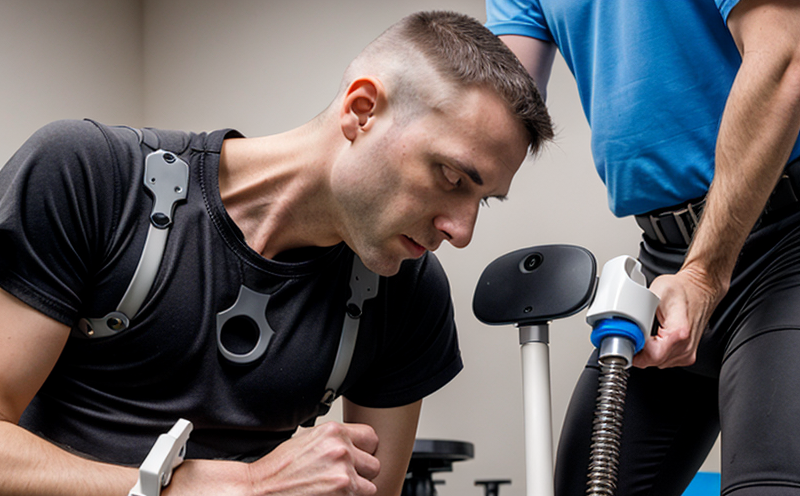ASTM F2502 Nitinol Orthopedic Device Fatigue Testing
The ASTM F2502 fatigue testing standard is a critical procedure for ensuring the reliability and durability of orthopedic devices made from nitinol. This test evaluates the mechanical performance of these devices under repetitive loading conditions, simulating real-world usage scenarios such as walking or movement in joint replacements. Nitinol, with its unique superelastic properties, makes it an ideal material for medical devices requiring flexibility combined with high strength and resilience.
During ASTM F2502 testing, the device is subjected to a cyclic loading regime that mimics anticipated stresses during use. This process allows us to identify potential weaknesses in design or manufacturing processes before they become critical issues in patient care. The test setup typically involves applying controlled mechanical forces on the specimen at specified frequencies and amplitudes over extended periods.
The significance of this testing cannot be overstated, especially given the increasing demand for minimally invasive surgical interventions that rely heavily on advanced materials like nitinol. By adhering strictly to ASTM F2502 standards, manufacturers can demonstrate compliance with regulatory requirements while also enhancing product safety and efficacy.
Our facility uses state-of-the-art equipment capable of replicating complex loading conditions experienced by orthopedic implants in vivo. This includes custom fixtures designed specifically for different types of nitinol components, such as wires, screws, or plates used in joint reconstruction procedures. Our team has extensive experience operating these systems and interpreting results according to international guidelines.
| Parameter | Range |
|---|---|
| Load Amplitude | 0.5% to 10% of nominal yield strength (σY) |
| Cycle Count | 1,000 cycles or more depending on expected service life |
| Load Frequency | 0.5 Hz to 2 Hz depending on application type |
The testing procedure begins with thorough preparation of the nitinol samples, ensuring they are free from defects and properly aligned within the fixture. Specimens must meet strict dimensional tolerances specified in ASTM F2502 to ensure accurate results.
Following successful completion of the fatigue test, our experts analyze the data collected using advanced software tools that provide detailed insights into how each component performed throughout the experiment. Key metrics include residual strain after testing, fracture location if applicable, and overall stress concentration factors.
This information is then compiled into comprehensive reports tailored to meet client needs, which may range from simple pass/fail assessments to detailed failure analyses complete with recommendations for improvement. These documents serve not only as proof of compliance but also valuable resources for ongoing research and development efforts aimed at advancing orthopedic technology further.
In conclusion, ASTM F2502 fatigue testing plays a pivotal role in ensuring the quality and reliability of nitinol-based orthopedic devices. By leveraging this standard, medical device manufacturers can enhance their products' longevity and safety while meeting regulatory expectations. Our laboratory offers unparalleled expertise in conducting these tests accurately and reliably.
Industry Applications
| Application Area | Description |
|---|---|
| Joint Replacements | Evaluating the durability of nitinol components used in hip or knee replacements. |
| Surgical Instruments | Assessing the robustness of tools designed for minimally invasive surgeries involving nitinol wires or staples. |
| Bone Anchors and Fixation Devices | Determining the reliability of fixation devices used in fracture repair procedures. |
| Cardiovascular Implants | Testing nitinol stents or heart valves for their ability to withstand repeated deformations without failure. |
The wide range of applications underscores the importance of ASTM F2502 testing in ensuring safe and effective medical devices. Whether it's a simple wire used in a minimally invasive procedure or an intricate stent designed to restore blood flow, every component must undergo rigorous evaluation to ensure patient safety.
Why Choose This Test
Selecting ASTM F2502 fatigue testing for your nitinol orthopedic devices offers several advantages that set you apart from competitors:
Regulatory Compliance: Adherence to established standards ensures compliance with FDA, CE Marking, and other relevant regulatory bodies. This can expedite market entry processes significantly.
Patient Safety: By identifying potential weaknesses early in the development cycle, you contribute directly to improved patient outcomes by reducing risks associated with device failures during use.
Cost Efficiency: Early detection of issues through thorough testing can prevent costly recalls later on. Additionally, streamlined regulatory approvals mean faster time-to-market, potentially saving millions in lost revenue due to delays.
Innovation Support: Our laboratory supports cutting-edge research and development initiatives by providing reliable test data that informs new design iterations and material selections.
Reputation Building: Demonstrating commitment to quality through rigorous testing enhances your brand reputation among stakeholders, including healthcare providers, patients, and investors.
Environmental and Sustainability Contributions
Incorporating ASTM F2502 fatigue testing into your product development pipeline not only improves device performance but also contributes positively to environmental sustainability:
Eco-Friendly Design: By ensuring that nitinol components do not fail prematurely, you help minimize waste generation by extending the lifespan of medical devices. This reduces the need for frequent replacements and associated disposal costs.
Resource Conservation: The ability to predict and prevent failures allows manufacturers to optimize production processes, reducing material usage while maintaining high standards of quality.
Ethical Responsibility: As a leader in the industry, choosing ASTM F2502 fatigue testing aligns with broader commitments towards ethical practices within healthcare delivery systems. It reflects your dedication to upholding the highest levels of integrity and responsibility throughout supply chains.





